Grammy Winning Violinist Joshua Bell Delights Masses at DC subway concert
A violinist played for 45 minutes in a New York subway. A handful of people stopped, a couple clapped, and the violinist managed to raise about $30 in tips.
No one knew this, but the violinist was Joshua Bell, one of the best musicians in the world. In that subway, Joshua played one of the most intricate pieces ever written with a violin worth 3.5 million dollars.
Two days before he played in the subway, Joshua Bell sold out a theater in Boston and the seats averaged about $100.
The experiment proved that the extraordinary in an ordinary environment does not shine and is so often overlooked and undervalued.
There are brilliantly talented people everywhere who aren’t receiving the recognition and reward they deserve. But once they arm themselves with value and confidence and remove themselves from an environment that isn’t serving them, they thrive and grow.
Your gut is telling you something. Listen to it if it’s telling you that where you are isn’t enough!
Go where you are appreciated and valued.
Know Your Worth.
source
Joshua Bell performed the first movement of Bach’s Violin Concerto at Washington, D.C.’s Union Station.
Joshua Bell performed the first movement of Bach’s Violin Concerto at Washington, D.C.’s Union Station.
Back in 2007, pedestrians hurried by without realizing that the busker playing at the entrance to a Washington D.C. Metro stop was none other than the Grammy-winning Joshua Bell. Gene Weingarten wrote about the Washington Post social experiment (“In a banal setting at an inconvenient time, would beauty transcend?”) and later won a Pulitzer Prize for his story.
In 2007, Grammy-winning Joshua Bell donned a baseball cap and played Bach on his violin during rush hour in a D.C. Metro station as part of a Washington Post social experiment.
Today, Bell set up at the entrance of Union Station. Seven years later, he held a very different kind of performance; this time, he was anything but ignored.
“Music — you need the give and take from the audience, the feeling of attention. It’s not about me its about the music itself,” Bell told senior correspondent Jeffrey Brown after the concert. “Today, I was a little bit surprised at how many people came. I was a little worried that when I agreed to do it that there might be only a handful of people and it might be embarrassing, so this far exceeded my expectations. I was so happy.”
Situated in the main hall, Bell, one of the most acclaimed classical musicians in the world, played Bach and Mendelssohn for a 30-minute performance to promote music education. He was accompanied by nine students from the National YoungArts Foundation. These young musicians are featured alongside the violin virtuoso in his HBO documentary special “Joshua Bell: A YoungArts MasterClass,” which will premiere on Oct 14.
“Where we need to work on is getting is making sure [music] is a part of everyone’s educational diet in the school. Music and art is part of what it means to be a human being and to be make it just an extra curricular thing is sad because most kids will not get any musical experience if they don’t have it in their school.”
Joshua Bell spoke to senior correspondent Jeffrey Brown about the important of music education just after his train station concert. See an excerpt from the interview below.
With more than 30 years as a celebrated violinist, Bell has recorded more than 40 albums. Today, in conjunction with the train station concert, the violinist’s newest album was released.
Stay tuned for Joshua Bell’s full concert and more video excerpts. Jeffrey Brown’s interview with Bell will air on tonight’s PBS NewsHour.
Did Violinist Joshua Bell Play Incognito in a Subway?
Do we perceive beauty? Do we stop to appreciate it? Do we recognize the talent in an unexpected context?
Many a marketing survey has been conducted to gauge how presentation affects consumer perceptions of quality, and quite a few such surveys have found that people will frequently designate one of two identical items as being distinctly better than the other simply because it is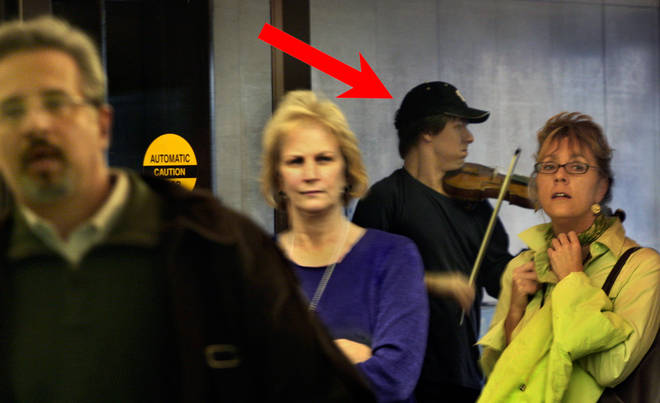 packaged or presented more attractively. Might this same concept apply to fields outside of consumer products, such as the arts? Would, for example, people distinguish between a world-class instrumental virtuoso and an ordinary street musician if the only difference between them were the setting?
packaged or presented more attractively. Might this same concept apply to fields outside of consumer products, such as the arts? Would, for example, people distinguish between a world-class instrumental virtuoso and an ordinary street musician if the only difference between them were the setting?
Consider, for example, the following narrative:
A Most Interesting Story
A man sat at a metro station in Washington DC and started to play the violin; it was a cold January morning. He played six Bach pieces for about 45 minutes. During that time, since it was rush hour, it was calculated that thousands of people went through the station, most of them on their way to work.
Three minutes went by and a middle aged man noticed there was musician playing. He slowed his pace and stopped for a few seconds and then hurried up to meet his schedule. A minute later, the violinist received his first dollar tip: a woman threw the money in the till and without stopping continued to walk. A few minutes later, someone leaned against the wall to listen to him, but the man looked at his watch and started to walk again. Clearly he was late for work.
The one who paid the most attention was a 3 year old boy. His mother tagged him along, hurried but the kid stopped to look at the violinist. Finally the mother pushed hard and the child continued to walk turning his head all the time. This action was repeated by several other children. All the parents, without exception, forced them to move on.
In the 45 minutes the musician played, only 6 people stopped and stayed for a while. About 20 gave him money but continued to walk their normal pace. He collected $32. When he finished playing and silence took over, no one noticed it. No one applauded, nor was there any recognition.
No one knew this but the violinist was Joshua Bell, one of the best musicians in the world. He played one of the most intricate pieces ever written with a violin worth 3.5 million dollars.
Two days before his playing in the subway, Joshua Bell sold out at a theater in Boston and the seats average $100.
This is a real story. Joshua Bell playing incognito in the metro station was organized by the Washington Post as part of an social experiment about perception, taste and priorities of people. The outlines were: in a commonplace environment at an inappropriate hour: Do we perceive beauty? Do we stop to appreciate it? Do we recognize the talent in an unexpected context?
One of the possible conclusions from this experience could be: If we do not have a moment to stop and listen to one of the best musicians in the world playing the best music ever written, how many other things are we missing?
Washington Post writer Gene Weingarten tackled some of these questions in 2007 when he enlisted renowned violinist Joshua Bell, a winner of the Avery Fisher Prize for outstanding achievement in classical music who regularly undertakes over 200 international engagements a year, to spend part of a morning playing incognito at the entrance to a Washington Metro station during a morning rush hour. Weingarten set up the event “as an experiment in context, perception and priorities — as well as an unblinking assessment of public taste: In a banal setting at an inconvenient time, would beauty transcend?”
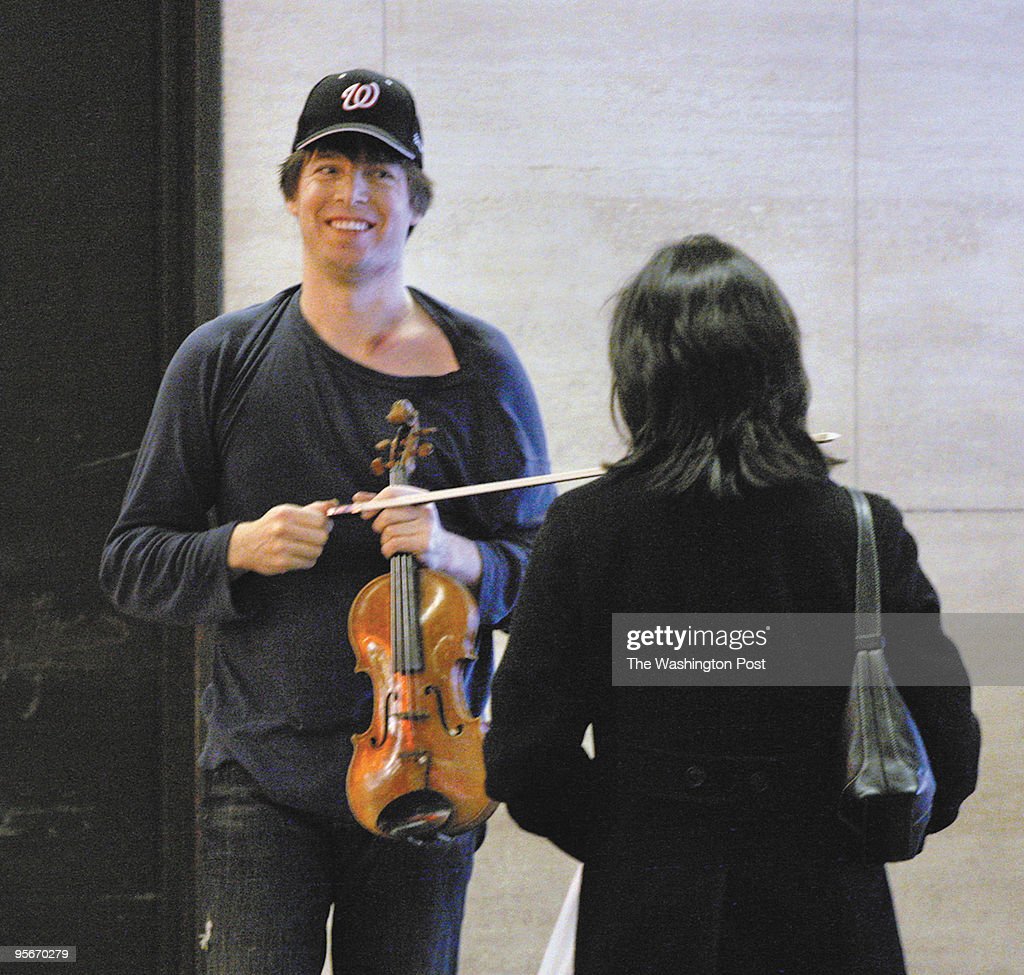
The time when Joshua Bell went busking in the subway, and no-one noticed
He’s one of the finest talents in the classical music world, and in 2007 violinist Joshua Bell went busking as an experiment. Would the public realise just what was happening, alongside their daily bustle?
Music director of the Academy of St Martin in the Fields, worldwide star soloist, and former child prodigy. His instrument is a Stradivarius from 1713 and his hair is an icon of classical music in itself….
Joshua Bell is one of the world’s great virtuosos, and one of the biggest names in classical music.
And in 2007 he did some anonymous busking, as a little social experiment to see what might happen.
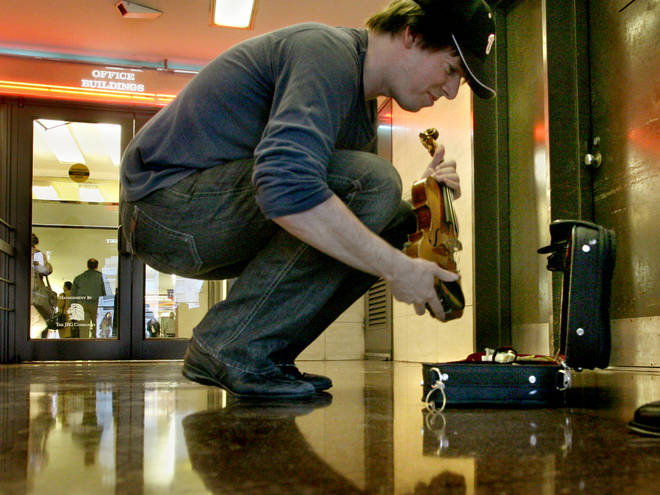
What happened when Joshua Bell went busking?
The Washington Post joined Bell in his tuneful test. Ahead of the experiment, the newspaper quizzed American conductor Leonard Slatkin about his predictions.
Slatkin said, “Out of 1,000 people, my guess is there might be 35 or 40 who will recognise the quality for what it is. Maybe 75 to 100 will stop and spend some time listening.” Slatkin thought Bell might make $150 (£121) from his musical metro endeavours.
Read more: The 25 greatest violinists of all time
It was 7.51am on Friday 12 January 2007, in the middle of the morning rush hour, when baseball-capped Bell opened his violin case and started playing, just inside L’Enfant Plaza Metro entrance in the busy centre of Washington DC.
Over a period of 43 minutes, the violinist performed six classical pieces, two from Bach pieces, one Massenet, and one each from Schubert and Ponce.
Out of 1,097 people that passed by Bell, 27 gave money, and only seven actually stopped and listened for any length of time.
In total, Bell made $52.17 (£42.18). And this includes a $20 note from someone who recognised him.
$32.17 for Joshua Bell? It’s not exactly what we – or indeed Slatkin – might have expected. The surprising result of the experiment went viral, and was shared around the world.
Some people see it as a sorrowful tale of all the people who just walked by – of a world too busy, too preoccupied, too uncurious, or even simply disinterested in the best that classical music has to offer.
We’re not so sure.
Perhaps, it just is what it is. For those precious 40-something minutes there was music being made among us and for us; as it is every day – whether it be from a Joshua Bell, a future Joshua Bell, or a not-quite Joshua Bell (but who loves music just the same).
Many at the time also thought it a valuable reminder about the musical talent of buskers and informal performers, who are around us most days.
The legacy of one of classical music’s most viral stories
The informal and spontaneous theme has continued for Bell ever since. In 2014 he surprised a young busker live on television and played a duet with him. And seven years after his L’Enfant Plaza busking experience, the virtuoso returned to the Washington DC Metro. All was very different the second time around.
The violinist returned with players of National YoungArts Foundation, and a bit more fanfare. There was press attention and Instagram pictures galore.
15 years later, the social experiment is one that’s still talked about (with varying levels of accuracy, according to the feature’s original author). It’s also one that’s often recreated in the social media age.
Maybe the biggest lesson is just in the power of music, whether seen or unseen, noticed or unnoticed. And don’t you just wish that the next time you walked into a railway station, there was a Joshua Bell, or a Nicola Benedetti playing Bach’s Chaconne for solo violin?
A Most Interesting Story
A man sat at a metro station in Washington DC and started to play the violin; it
was a cold January morning. He played six Bach pieces for about 45 minutes.
During that time, since it was rush hour, it was calculated that thousands of people
went through the station, most of them on their way to work.
Three minutes went by and a middle aged man noticed there was musician
playing. He slowed his pace and stopped for a few seconds and then hurried up to
meet his schedule. A minute later, the violinist received his first dollar tip: a
woman threw the money in the till and without stopping continued to walk. A few
minutes later, someone leaned against the wall to listen to him, but the man looked
at his watch and started to walk again. Clearly he was late for work.
The one who paid the most attention was a 3 year old boy. His mother tagged him
along, hurried but the kid stopped to look at the violinist. Finally the mother
pushed hard and the child continued to walk turning his head all the time. This
action was repeated by several other children. All the parents, without exception,
forced them to move on.
In the 45 minutes the musician played, only 6 people stopped and stayed for a
while. About 20 gave him money but continued to walk their normal pace. He
collected $32. When he finished playing and silence took over, no one noticed it.
No one applauded, nor was there any recognition.
No one knew this but the violinist was Joshua Bell, one of the best musicians in
the world. He played one of the most intricate pieces ever written with a violin
worth 3.5 million dollars.
Two days before his playing in the subway, Joshua Bell sold out at a theater in
Boston and the seats average $100.
This is a real story. Joshua Bell playing incognito in the metro station was
organized by the Washington Post as part of an social experiment about
perception, taste and priorities of people. The outlines were: in a commonplace
environment at an inappropriate hour: Do we perceive beauty? Do we stop to
appreciate it? Do we recognize the talent in an unexpected context?
One of the possible conclusions from this experience could be: If we do not have a
moment to stop and listen to one of the best musicians in the world playing the
best music ever written, how many other things are we missing?

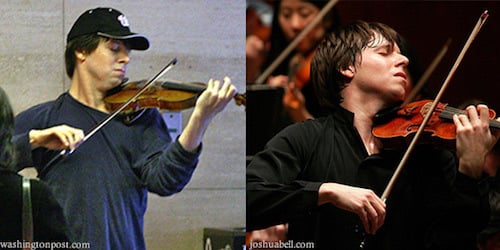
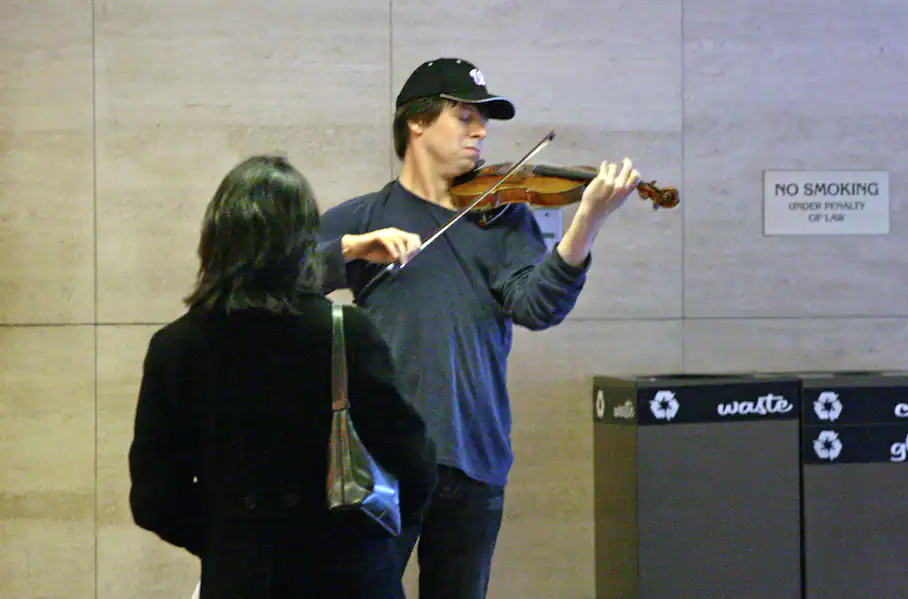
 In a stunt ginned up by a newspaper named the Post — the Chicago Evening Post — violin virtuoso Jacques Gordon, a onetime child prodigy, performed for spare change on his priceless Stradivarius, incognito, for three-quarters of an hour outside a subway station. Most people hurried past, unheeding. The violinist made a few measly bucks and change. It was a story about artistic context, priorities and the soul-numbing gallop of modernity.
In a stunt ginned up by a newspaper named the Post — the Chicago Evening Post — violin virtuoso Jacques Gordon, a onetime child prodigy, performed for spare change on his priceless Stradivarius, incognito, for three-quarters of an hour outside a subway station. Most people hurried past, unheeding. The violinist made a few measly bucks and change. It was a story about artistic context, priorities and the soul-numbing gallop of modernity.